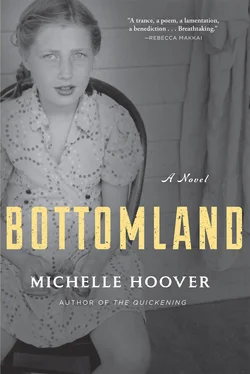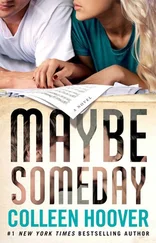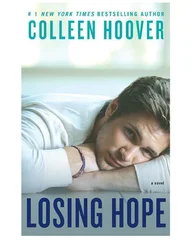“Wake up, Hush. You listening?” Trouble was, I couldn’t keep straight one story from the next, mine or his. Squire repeated a second time. Sometimes a third. He’d have snapped his fingers if he could. At night, I had dreams. I was sitting with the boys in a barn. Me, Critters, Stan, and Sam Bullet. That was us. Our stomachs were full. Our heads soft. That barn had a fair shake of hay, the nicest bed we’d had in weeks. Stan was watching me, and Critters too. They called my name. Then the hay blasted to fire beneath us. When I looked, there was nothing but straw burnt up where the boys had been. The ends of my legs, where my feet had gone to nothing, they were burnt too.
Someone pulled at my arm. “Private Hess.” A doctor stood at my bedside, clipboard in hand. “Do you remember what day it is? Do you know where you are?” I said I knew the day just fine. It was November.
“Look out that window, Private Hess. Does it look like November to you?”
The nurse wheeled me out. The sun was hard on the grass. The garden beds, they were some full. I couldn’t figure that. “I can lower these footrests now,” the nurse said. I turned my head to see her, but felt dizzy fast. “You’ll be right as rain,” she went on. “Just a tingling in those feet of yours. Pretty soon you’ll be pushing this chair yourself.” But the doctors wouldn’t sign my release, that’s what I wanted to tell her. I thought of Squire too. How he might have made sense if I wasn’t the one to hear him. How I might have something more than boot rot. The nurse shook her head. “Nerves is all. That blast, it knocked you clear out.”
“What about the others?” I asked.
The nurse stayed quiet. “Tell you what,” she said. “We can go off when you’re feeling better. Have our own little adventure. The war’s over. Why, even this place, it’ll be closed in a month or two. Made into a boarding school. Wouldn’t you like that?”
“That would be something.” In truth I believed different. Those beds were no place for kids. Even with a man gone, he was still there. Even when they put another one in his place.
It must have been time for winter crops. That’s what I thought that night. End of November, it must have been. No matter that garden or the doc. At home the rush of work before the snow. The first frost would have killed a fair lot, and they’d be trying to save the rest. By now, Mother would have picked her turkey from the pen. She’d be feeding it meal to get it fat, worrying about her cellar shelves. How many more jars they could hold. How much we’d need to make three months, maybe four. Nan would be a help to her, but not the others as much. If I was there, I’d be a help too.
“Here you are, Private Hess.”
I woke, a ringing in my ears. No matter how I tried, I couldn’t pry that ringing out. The doctor was back, the nurse too. Even Squire was quiet in his bed, perched on his pillows, watching us. “Hey there, Hush,” he said. “You all right?”
“You asked for a map,” the nurse said. “Don’t you remember?” She gave me a piece of paper wide as it was long. The doctor didn’t seem happy about that. Still the nurse moved my tray to straighten the map out. “Look.” She pointed. “That’s France. We’re in the east, near the Belgium border. And there’s England across the Channel. In the south, near the Schonholz Woods. That’s where they picked you up.”
“That’s where they picked me up,” I said.
“That’s right.” The nurse smiled with her mouth closed.
“Right,” the doctor said, sharp. He signed a piece of paper on his board, tore it off. When he left, that paper sat on my legs, but I couldn’t reach it. I didn’t even try.
The nurse pointed again at the map. I couldn’t remember asking for maps. The shapes didn’t add up to nothing much. And there wasn’t one piece of land looked bigger than my thumb. “Private Hess,” the nurse said. She was watching me now too. She’d pulled up a chair, her hand on the rail. I blinked, trying to read the map again. There was France and Belgium, their borders a hazy green. Then Germany to the east, England at the center. But to the west, only a wide drop. “We’ve received a telegram for you,” the nurse said. “It’s about your mother.” Her eyes looked wet. “The doctor has signed your release. You can leave anytime you want.” She dropped her hold on the rail and touched my wrist. Her hand was some cold. This nurse wasn’t anywhere close to the same as Esther. Private Hess , she said again, but it was all a buzz. Hush. That’s the name the boys liked. But better than that, the one Mother had picked from the start.
“Lee, ma’am,” I told the woman next to me on the Chicago train. “Lee Hess.” From the look on the woman’s face, she didn’t know what to do with a name like mine. Almost two years after the war and Dutchy by the sound of it. She squinted to fish me out. “I was with the 351st Infantry, in the 88th,” I hurried on. At that, she smiled.
It was late afternoon. I’d been traveling since dark the day before. “Two girls who’ve lost their mother,” the deputy had said. “Two girls like that.” A strange thing, that empty room of theirs. Stranger yet, that chair against the door. Without Myrle and Esther, the beds seemed cast off in so much space. There wasn’t any reason for the girls to leave, but Esther didn’t need reasons. I can find them , I’d told Nan, though her face said not. With all the work before winter, the farm couldn’t run more than two weeks with another hand gone. Her face said that too. Two weeks is more than plenty , I said. I didn’t have a dollar more to last longer. Now on that bench, my legs were a twitch from sitting, my back a rail. Out the window, there was never so much as a tree or post in the fields to catch a person’s eye.
“You’re going to ruin that hat,” the woman said.
I looked down. The hat in my lap I’d creased once and again. Like a fat piece of skin. Skinned and trying to be something. The woman said her name was Helen. She only gave her first.
“A man without a hat,” Helen said. “That’s not even polite. Not if you step off this train. Let me take it before you turn it to ribbons.” She pulled the hat from my fingers and rested it on her knees, working to smooth it out. That smile of hers, it was still there. Her hands were soft and white. The cheeks of a mother, that’s what she had.
“Sorry, ma’am.”
“I’ve been watching you. You haven’t eaten all this time.”
“I’m fine, ma’am.”
“No you’re not. I know boys. They have to eat every minute. And pretty soon you’re going to take a bite out of this hat.” She opened her bag to show a napkin, blue and stitched at the edges with birds. Inside, five rolls the color of wheat. “Here you are.” She dropped one on my knee. “I have too many for myself.”
I bowed my head.
“Don’t you worry. I had a boy your age, though he wasn’t so quiet. Sometimes I wish he had been. Slow down, I was always telling him. Try to listen. You’re a listener, I can tell. It will do you good, listening to people instead of always going on. Like me.” She laughed. “But if you aren’t going to say much, you should at least do me a favor and eat.”
I took a bite and tasted butter. Raisin bursts and poppy seeds.
“My, you liked that one, didn’t you? Here’s another.”
“No, ma’am. I couldn’t.”
“You can because you will. As I told you. I had a boy like you. If he was still with me, I’d fill him till he popped.” Her cheeks fell. She hid a sigh behind her hand. “The 88th,” she said, but I wasn’t sure I was supposed to hear. “That sounds just fine.” She folded her napkin as if bundling a living thing. After that, she fell asleep or seemed to. I thought of her boy and the age he must have been. The war had taken nearly all of us one draft after another. All except Ray, but he got hit with something almost as bad.
Читать дальше












